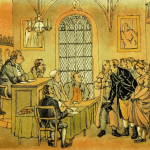“The last enemy to be destroyed is death.” -1 Corinthians 15:26
We first met Lacey in a pet store in Raleigh, North Carolina. My wife and I had been married about eight months and had decided to take the next step in married-adult responsibility: getting a pet. We quarreled over how big our dog should be. I wanted a larger dog, like a Labrador. She wanted a lap dog, like a poodle. Lacey was a Shetland Sheep dog. She was eight weeks old, black and white with tan on her legs, and she was perfect. She growled and untied my shoes at the pet store. That’s why we named her Lacey, she liked to grab shoelaces.
Lacey was a successful step in our quest to see if we were responsible enough to remember to feed, water, and exercise another living being. But she made it easy on us. She always remembered to go to the door when she needed to “go potty.” She only had to be taught once not to get into the trash can. She liked attention, but did not demand it. She was content to lie at our feet while we sat and watched television. She only barked at cars and thunder.
In the next few years, we added our two children to the mix. Lacey tolerated the children with great patience. She let them pet her, pull her tail, her hair, or carry out whatever accidental tortures children will inflict upon the family dog. As a herding dog, she felt it was her duty to watch them and corral them back towards the house when they played outside. Even when the children grew older, she would never submit to their commands. They were her charges; she was not theirs.
After ten years, we could see the signs of age creeping up on her. She got arthritic and could not go up and down the steps very well. At the end, I carried her up and down the steps for fear that she would tumble down them. She also had the occasional seizure, but they never lasted very long. The vet assured us that this was not painful for Lacey. It was a kind of dream-state for her, so we just soothed her when she had them. She would awaken like nothing had happened and carry on.
Except last week, she didn’t. My wife found Lacey on the back porch seizing. She had no idea how long it had been but was pretty certain that it was beyond the five minute window. I came home from work to sit with her. I sat with her for a half hour petting her and hoping that she was come out of “status epilepticus”. But I knew she wasn’t going to.
We sent the children home with friends, and I told my wife I was going to take her to the farm. My wife cried and said she could not go. I told her that was fine but she needed to say goodbye. I made Lacey a soft bed in the back of the Jeep, soft enough not to feel a single bump in the road. I prayed that she would wake up. I prayed that she would die on the way. She did neither.
When it was time for Lacey to be fed, she stared at me until I fed her. If she needed to go out, she sat by the door and watched me until I opened it. If I told her to “sit” and “stay”, she would sit there until I told her to come, but her head was on a swivel, watching me where ever I went. I took care of everything for her, and she trusted me. She knew, as she sat there, that I wasn’t really leaving. She knew I would call her and she would come running. She knew I would feed her. She knew that resistance to the bath was futile, and so she sat in the tub, even resisting the urge to shake until I told her to do so.
I couldn’t help her this time, and it wasn’t Lacey’s fault. She was seizing to death and I couldn’t bring her out of it. Lacey was dying, and the sin that inflicted this curse on her wasn’t her own.
I laid Lacey down on the soft grass under a small oak tree and started to dig. I dug deep so that no creature would bother her. I knelt down and petted her and told her she was a good dog, that she was a more faithful companion than I was a master, and that she had often given more love than she had gotten. I wanted to pray, but I did not have any words, so I just sat in silence for a time petting my dog. Her breathing was ragged, her body was stiff, and her saliva had turned an ugly shade of green. I pulled my pistol from my pocket and told her I was sorry.















